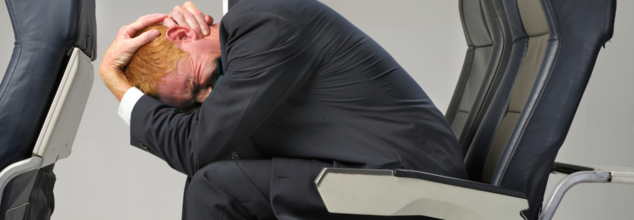- Health Conditions A-Z
- Health & Wellness
- Nutrition
- Fitness
- Health News
- Ayurveda
- Videos
- Medicine A-Z
- Parenting
- Web Stories

(Credit-Canva)
Experiencing Nighttime Anxiety? Avoid Doing These Things At Night
Anxiety often picks up pace when you are resting or when your body is at ease with many reporting their anxiety peaking at night, disrupting sleep. Although there is no clear reason why you get nighttime anxiety or panic attacks but a recent study published in the PNAS, explains that trouble sleeping due to unwanted, popping-up memories are common in various mental health problems. Th study found that when people don't get enough sleep, they struggle to control these intrusive memories. Using brain scans, the researhcers saw that this happens primarily due to the malfunctioning of the brain areas that normally help stop unwanted memories from coming up. Basically, implying to sleep loss messing up the brain's ability to block unwanted memories.
Habits That Can Cause To Nighttime Anxiety
There are many things that can make this anxiety worse as well! It's common to find yourself wide awake at night, replaying the day's events or scrolling through your phone. This happens because, as the day's distractions fade, your mind is left alone with its thoughts. According to a global survey 42% people struggle with sleep due to anxiety and 27% due work-related stress. The brain doesn't easily switch from high alert to sleep mode. Habits like checking work emails or late-night screen time keep the nervous system active. Bright lights and stimulating activities prevent the brain from slowing down, leading to lighter, less restful sleep.
Doom-scrolling
Spending too much time looking at bad news or endless videos on your phone can make you feel stressed. It's like your brain is playing a game where it keeps looking for something new, but it never relaxes. This makes your body release stress hormones, which keep you awake. Instead, try to stop looking at screens a few hours before bed. Read a book or write in a journal to help your mind calm down.
Checking Work Emails
Reading or answering work emails at night makes your brain think about work problems. This keeps you alert and makes it hard to relax. The bright light from screens also stops your body from making the sleep hormone. Try turning off work notifications and stopping work emails a few hours before bed. This will give your brain time to unwind.
Taking Certain Medications Too Late
Some medicines, like those for ADHD, can keep you awake if you take them too late. These medicines make your brain more alert, like drinking coffee. If you're having trouble sleeping, talk to your doctor. They might be able to change when you take your medicine or change the dose.
Having Caffeinated Drinks
Drinks like coffee, soda, and tea have caffeine, which keeps you awake. Caffeine stays in your body for a long time, so even if you drink it in the afternoon, it can still affect your sleep at night. Try to stop drinking caffeine by lunchtime. In the evening, drink herbal tea instead.
Eating Heavy Meals Before Bedtime
Eating big meals before bed can cause stomach problems and make it hard to sleep. Also, eating too early can mess with your body's sleep schedule. Try to stop eating a few hours before bed. If you're hungry, have a light snack. Avoid drinking alcohol close to bedtime as well.

Credit: Canva
Beginner's Guide To Orgasmic Meditation—What Are The Health Benefits?
Orgasmic Meditation (OM) is a unique wellness practice that brings together mindfulness, touch, and pleasure. For those unfamiliar, this partnered activity involves one person gently stroking the upper-left quadrant of the clitoris in an up-and-down motion for 15 minutes. The intention? Not climax — but connection, presence, and awareness.
The technique is precise: the stroking must be no firmer than one would touch an eyelid. Usually, the person performing the strokes wears latex gloves lubricated with a personal lubricant. Notably, there is no genital stimulation of the stroker, and the act itself is not meant to serve as foreplay.
Despite its name, OM is less about achieving orgasm and more about exploring sensation and emotional intimacy. Practitioners often describe the experience as meditative — a path to becoming fully present in one's body.
OM Was Introduced In 2009
While the traditional meditation practices aim at connecting the individual with themselves, these new age techniques are more focused towards reducing anxiety and calming the mind. OM was introduced by OneTaste. Founded by Nicole Daedone and Rob Kandell, this company promoted OM as "A pleasurable place for your body to be."
However, OneTaste later came under scrutiny, with former members accusing it of coercive financial practices and describing it as a "sexual wellness cult." The backlash led to a rebranding — OneTaste became the Institute of OM. Still, the practice continues to attract individuals seeking deeper sexual connection and personal fulfilment.
Is OM Just Another Form of Meditation?
Traditional meditation is often seen as spiritual or philosophical. Today, it's more commonly embraced as a health tool — a method to reduce stress, improve focus, or even aid therapy. But at its core, meditation is about being fully present and tuning into one’s authentic self.
Still, OM is not for everyone. It involves physical intimacy and often costly sessions. For those who prefer less intensive alternatives, traditional meditation apps and guided practices are widely available.
Are There Any Health Benefits Of Organismic Meditation?
Practitioners often claim increased happiness, reduced anxiety, and more connected relationships. Some report better communication, heightened confidence, and a deeper understanding of their partner’s emotional and physical needs.
While orgasm is not the goal, some do experience it—and with it, potential health benefits like the release of endorphins, reduction in cortisol, and temporary relief from pain. Moreover, OM shares many of the known benefits of conventional meditation: better sleep, sharper focus, reduced blood pressure, and mood improvement.
Getting Started With OM
There are plenty of resources online—articles, audios, and videos—to help beginners explore OM. While there is a common structure, there's no strict right or wrong way. You can even try a solo version of the practice.
Amid today’s fast-paced routines, OM offers a new form of self-care — one that asks for just 15 minutes of intentional touch and total presence. For many, it’s a meditative practice that bridges the gap between sexuality and mindfulness.
ALSO READ: This Commonly Used Pill Can Boost Cancer Survival By 61%, Research Finds

Creidt: Canva
This Commonly Used Pill Can Boost Cancer Survival By 61%, Research Finds
There are millions of people who carry anti-cholesterol pills in their pockets. Official records state that eight million people consume statins to lower their risk of heart and circulatory diseases. Now, new research suggests that they do more than just benefiting your heart, they also mitigate the risk of cancer.
Recently, a study was conducted on blood cancer patients who were taking these pills at the start of their treatment. It was found that 61% per cent of them had a lower risk of cancer as compared to those not taking statins.
Here's The Research Explained
The research involved 1,467 patients with chronic lymphocytic leukaemia (a type of blood and bone marrow cancer) or small lymphocytic lymphoma, with an average age of 65. Patients were enrolled in one of four trials looking at the effects of a targeted cancer drug called ibrutinib.
The dose of statin was adjusted according to varied factors like age, gender, among others. Regardless of those factors, patients taking statins were found to have a 61% lower risk of dying from their cancer, a 38% lower risk of dying from any cause, and a 26% lower risk of their disease progressing.
But What Is Statin?
Statins are a class of medications primarily used to lower cholesterol levels in the blood. They work by blocking the enzyme HMG-Coa reductase, which is crucial for the liver's production of cholesterol. By reducing cholesterol production, statins help lower the risk of heart disease and stroke.Cancer Is The Leading Cause Of Death In The World
Cancer is the leading cause of death across the world. According to the World Health Organisation (WHO), it killed 10 Million people in 2020, with breast and lung cancer. and which can then invade adjoining parts of the body and spread to other organs; the latter process is referred to as metastasis. Widespread metastases are the primary cause of death from cancer.
The study was led by Dr Ahmad Abuhelwa, an assistant professor of pharmacy practice and pharmacotherapeutics at the University of Sharjah in the United Arab Emirates. Talking about the research, he said, "These findings don’t allow us to say for certain that statins directly improve cancer outcomes."

Credits: Canva
Why More People Are Anxious About Flying—And What You Can Do About It
There has been a recent increase in aviation-related headlines and tragic incidents that has triggered renewed anxiety about air travel. This has happened to even those who have previously felt at ease about boarding a flight. Statistics have continued to show that flying is one of the safest ways to travel, whoever, the number of people who have been affected by the fear of flying, or aerophobia has only grown.
This is based on the reports from psychologists, airport staff, and airline crew suggested a noticeable uptick in passengers expressing nervousness about flying. This trend is not just limited to those who have a long-standing fear of air travel. This has now been affecting to even those who were not concerned about it before. This may be due to the increasing media coverage, heightened safety concerns, and ongoing stress from broader life circumstances.
The recent data from the industry reflects a decline in air travel during early spring. While some airlines have suggested economic uncertainty and reduced government travels, the evidence suggest that there have been concerns over safety and psychological toll on recent aviation events, which has led to the decline in numbers.
Flight crews, especially those based near recent accident locations, have also felt the impact. Some crew members have taken time off to cope emotionally, and in a few cases, even left the profession due to increased stress.
What Is Aerophobia?
As per Trauma Research UK, aerophobia is an irrational fear or anxiety related to flying or being in aeroplanes. It is a type of specific phobia, which is an excessive or irrational fear of a particular object, situation, or activity. People with aerophobia may also experience intense anxiety, panic attacks, or avoidance behaviour when faced with situations involving air travel, such as boarding a plane, visiting an airport or even just thinking about flying.
How Does It Start?
It usually starts like how all other phobias start, from a 'learned behaviour'.
Bad Experience: A bad experience can be anything from experiencing turbulence, experiencing some form of trauma whilst abroad, seeing a frightening film as a child or feeling unwell on a plane
Copying A Parent: A lot of behaviour that we often do comes from looking at our parents If as a child, you have witnessed a grown up, who is supposed to be your protector, be scared of flights. Chances are, you will be scared too.
Becoming A Parent: Your parental protection instincts have kicked in and this fear may accelerate and become a phobia.
Transference: This often occurs when facing a stressful event whilst on holiday. As you are sitting on the plane homeward bound, the suppressed anxiety and stress catch up with you, causing an anxiety attack.
Psychologists also suggest that as individuals take on more responsibilities—like starting families or advancing in careers—their sense of vulnerability can increase, sparking fears that didn’t exist before.
Traumatic flight experiences, such as severe turbulence, can also act as a trigger. In some cases, broader anxiety disorders—such as social or travel-related stress—intersect with aerophobia, compounding the fear.
What Are The Symptoms?
For some, the fear of flying can lead to full-blown panic attacks. These may involve shortness of breath, dizziness, nausea, or a sense of being trapped. Airline crew members often assist passengers experiencing panic, sometimes administering oxygen or offering calming support during the flight.
How Can You Cope?
Deep breathing: Practicing longer exhales helps activate the body’s relaxation response.
Exposure therapy: This can involve gradually facing flight-related triggers—starting with looking at plane photos, watching flight videos, or using virtual reality simulations.
Mindfulness and acceptance: Learning to tolerate uncomfortable feelings rather than fight them can make anxiety more manageable.
Journaling symptoms: Some therapists recommend keeping a count of anxious moments to foster acceptance and track progress.
© 2024 Bennett, Coleman & Company Limited

